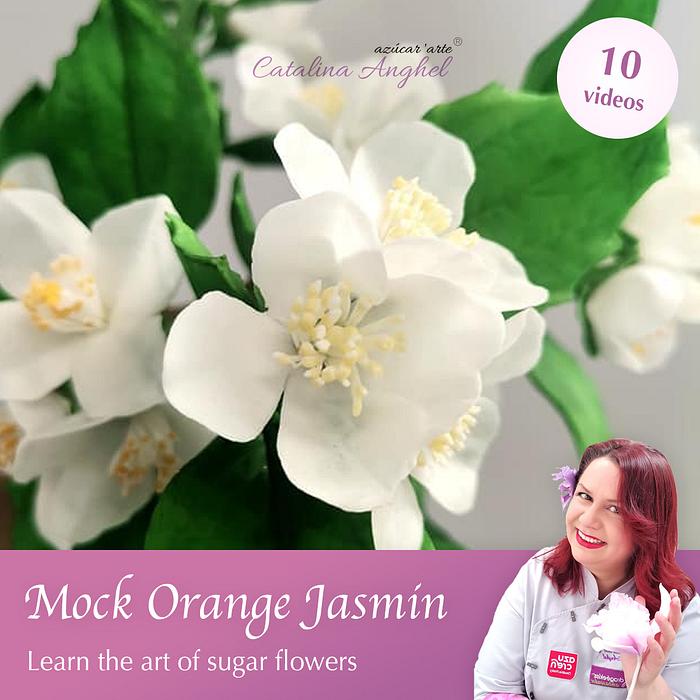Free-Formed Sugar Mock Orange Jasmin (Philadelphus)
Free-Formed Sugar Mock Orange Jasmin (Philadelphus)

If you always wanted to learn how to model beautiful sugar flowers for decorating your cakes now is the moment!
Join me for a sweet adventure and learn how to create this realistic Mock Jasmin without using any cutters or templates.
Learn how to model, paint and assemble each petal, stamen and leaf – step by step class with detailed video and explanations.
Lifetime access, my help and assesment for obtaining the best results, no matter if you are a complete beginner or already an experienced flower artist.
Let’s learn a bit more about the Mock Orange Jasmine (Philadelphus).
Philadelphus (/ˌfɪləˈdɛlfəs/1) (mock-orange) is a genus of about 60 species of shrubs from 3–20 ft (1–6 m) tall, native to North America, Central America, Asia and (locally) in southeast Europe.
They are named “mock-orange” in reference to their flowers, which in wild species look somewhat similar to those of oranges and lemons (Citrus) at first glance, and smell of orange flowers and jasmine (Jasminum). But Philadelphus is a basal asterid, not closely related to Jasminum (advanced asterids), and among the eudicots quite distant from Citrus (advanced rosids). An entirely misleading name for Philadelphus that is sometimes encountered is syringa; this properly refers to the lilacs, which are fairly close relatives of jasmine. The connection of the two shrubs lies in their introduction from Ottoman gardens to European ones, effected at the same time by the Holy Roman emperor’s ambassador to the Sublime Porte, Ogier Ghiselin de Busbecq, who returned to Vienna in 1562. The two shrubs appear together in John Gerard’s Herball, as “Blew Pipe” (the lilac) and “White Pipe Tree”, for the woods of both are pithy and easily hollowed out.
Philadelphus is named after an ancient Greek king of Egypt, Ptolemy II Philadelphus.
10 Video Lessons
-
 tools and materials list
tools and materials listflower paste sponge to dry petals powdered food dyes leaf green, yellow and brown florist tape flower wire thickness 18 and 26 small scissors cellpin tool sprayed food lacquer Cornstarch Mock...
-
 model the center- pistil and stamens
model the center- pistil and stamensMake white rubber paste balls, with diameter of 1 cm. Modeling as many balls as flower centers are modeled. Shape the cone, make a hole in the middle with the tip of the cellpin tool and with the...
-
 modeling flowers
modeling flowersMake white gumpaste balls, with diameter of 1 cm. Modeling as many balls as flower centers are modeled. Shape the cone, make a hole in the middle with the tip of the cellpin and with the scissors...
-
 modeling the buds
modeling the budsModel 8mm diameter white gumpaste balls. Cut wires thick 26 into 5 parts. Make a hook at one end. Insert the wire with the hook into the gumpaste ball. Fix the paste well on the wire. Using a wire,...
-
 model de sepals
model de sepalsDye gumpaste with green petal dust . Make 5mm diameter balls – as many green balls as flowers and buttons you have. Shape a cone using a ball. Insert the cellpin tool tip at the base of the cone....
-
 modeling the leaves
modeling the leavesCut wires thick 26 into 4 parts. Model 1cm diameter green dyed gumpaste balls. Shape as an olive bone. Flatten. Insert wire at one end until you reach the other but be careful that the wire does...
-
 paint the leaves
paint the leavespainting the leaves Once the leaves are dry paint them on both sides with leaf green petal dust.
-
 Glazing the leaves
Glazing the leavesCover the work surface with kitchen paper. Spray glaze on the leaves on both sides. Once this is done let them dry pricked on a sponge.
-
 assemble the branche
assemble the brancheAssemble small bouquets of flowers and buds and leaves using florist tape. Assemble the bouquets on wire thickness 18. Cover with green rubber paste a few centimeters of stem after assembling each...
-
 final touches
final touchesWith brown powder dye paint the stem of the Jasmin branch. Allow to dry pricked in a dummie or hanged .
Meet Your Instructor

Catalina Anghel azúcar'arte
My name is Catalina and I love sugar flowers ;)
I am addicted to sugar flowers veiners and edible petal dusts...LOL
I am a professional baker and sugar florist based in Vila-real( Castellón) Spain.
I developed my own method of making sugar flowers- I work free formed, all my flowers are made without using special cutters or templates.
I teach free formed sugar flowers both in grupal workshops or one to one tuition. Also have my online academy: Academia Azúcar´arte.
At the same time I study medicine at UJI University in Castellón and take care of my son, my husbant my beaggle and my cat.
huge sweet hugs
Catalina
🤗❤️